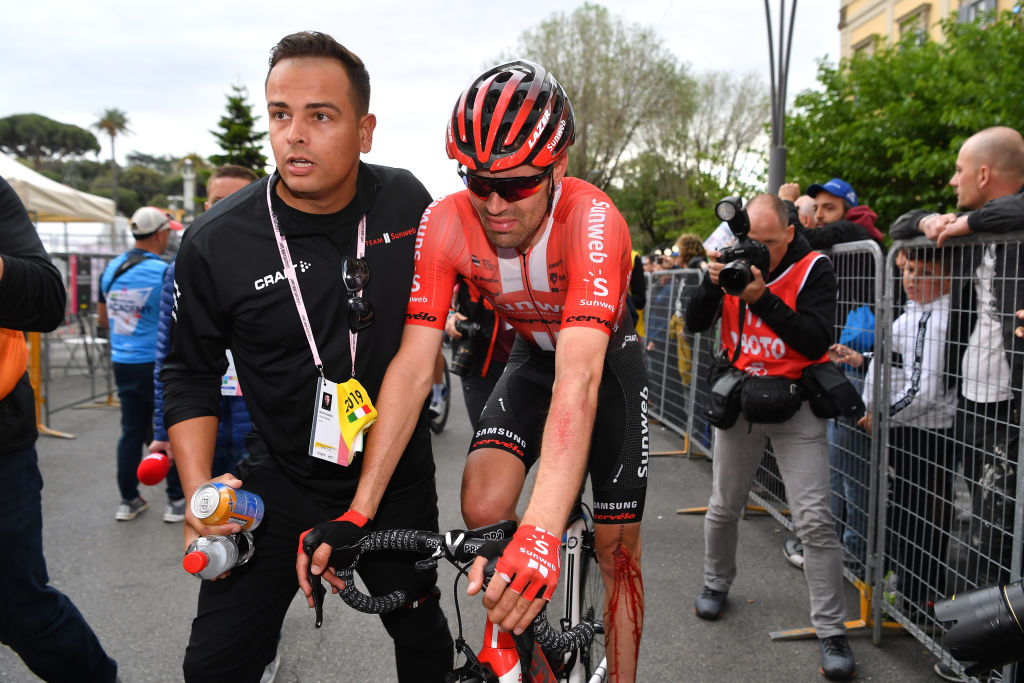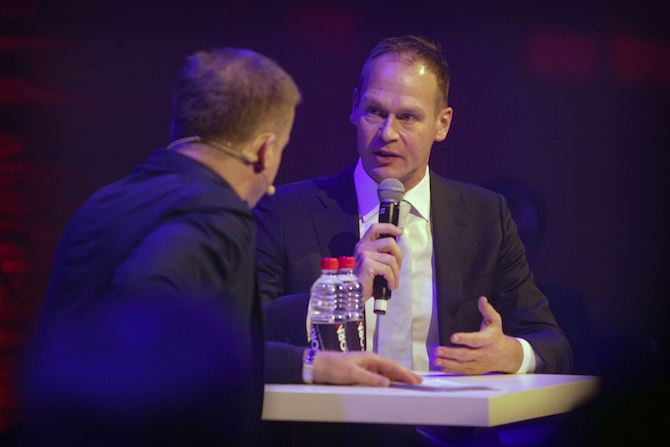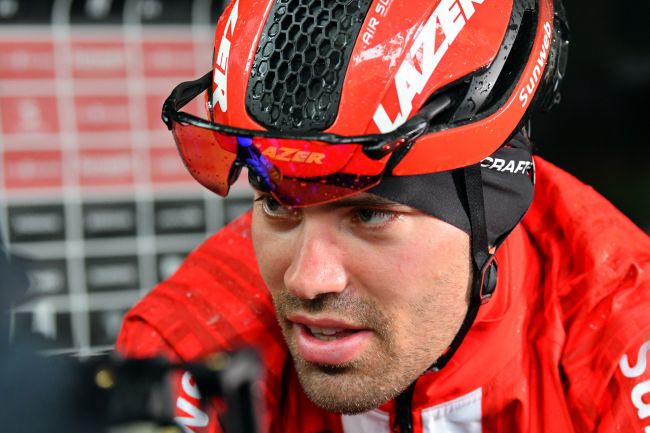Transfer Mechanics: Can Sunweb rebuild after losing Tom Dumoulin?
The divorce signals a crossroads for Iwan Spekenbrink's team that may take time to navigate

Last month's confirmation of Tom Dumoulin's switch from Team Sunweb to Jumbo-Visma was one of the most significant transfers of the summer, and one that could define the Grand Tour futures of both the rider and those two teams over the coming years.
However, the fact that Dumoulin broke his contract with two years remaining to join a rival squad raises legitimate questions over the relationships Sunweb have with their riders. The team have been placed in a precocious position and, as they look to rebuild, rebrand, and mount challenges on several fronts in 2020, Cyclingnews spoke to their general manager, Iwan Spekenbrink, about Dumoulin's departure and the team’s future.
According to Spekenbrink, the deal that cemented Dumoulin's move from Team Sunweb to Jumbo-Visma was one that benefited all parties. Whether those benefits were equal, however, is up for debate.
Certainly, Jumbo-Visma have acquired what they feel is the missing piece in the jigsaw that will deliver Grand Tour success, while Dumoulin has forced his way out of an unhappy situation and joined a team that he believes will provide him with a fresh start.
As for Spekenbrink and Sunweb, the positives are a little harder to find. They have lost their marquee rider, one of only a handful of potential Grand Tour winners in the peloton, and the talisman around whom so much of their strategy revolved.
"It's clear we struck a good deal and it's good enough for all parties. If it wasn't, then we wouldn't have agreed. That's clear," Spekenbrink says.
"We're a team with many people and many good riders. The day Johan Cruyff left Ajax, they didn't stop the next day. Years later Marco van Basten came around and the same happened again.
Get The Leadout Newsletter
The latest race content, interviews, features, reviews and expert buying guides, direct to your inbox!
"This year, star rider or not, Tom almost couldn't race. There's no magic formula for success in sport, no matter how good you are. You can't just have rider A, B, and C and win races. What you need is a philosophy in place that means you're successful as a team."
There's no doubt, however, that Dumoulin was Sunweb's A, B, and C when it came to stage racing. Granted, he had endured a miserable year on the bike but the last three Grand Tours Dumoulin had finished netted one victory and two second places. Outside of Ineos, no rider has come close to such levels of consistency.
From the very moment word of Dumoulin's wish to leave Sunweb surfaced, the management tried to keep their leading rider.
"Tom was an important rider in our team and we had big plans with him for the Grand Tours," Spekenbrink says. "Since he came to the team he gradually developed and he had a stunning year in 2017 with great numbers. 2018 was almost a confirmation of that and we hoped that the level could be stretched.
"We wanted to keep him. And there's also a principle in cycling, that contracts should be honoured. We didn't discuss anything else but, in the end, the discussion became more productive."
Those discussions took place ahead of the Tour de France after the farcical nature of Dumoulin's non-participation at the race. For those that aren't aware, Dumoulin was driving to the airport, on his way to a pre-Tour altitude camp, when he duly decided to jettison his summer by turning the car around and going home.
When news surfaced of Dumoulin's initial wish to leave the team, it was quickly denied by all involved, but the unrest between the rider and Sunweb goes back to even the end of 2017.
At the start of the following season, at the Abu Dhabi Tour, matters exploded in public when the Dutchman lost his cool after mechanical issues cost him. Those very accessible scenes illustrated a growing rift between athlete and management.
There was worse to come when Dumoulin expressed his desire for the team to keep Mike Teunissen, Simon Geschke, and Laurens ten Dam at the end of last season. When all three left, it was a bitter pill to swallow, especially given that Teunissen – who has the same agent as Dumoulin – had at one point expressed his desire to stay.
The replacements that came in at the start of 2019 simply weren't good enough, especially when the team was already stretched to breaking point between challenges at the Giro and the Tour. When Wilco Kelderman breaks a collarbone or Sam Oomen undergoes iliac artery surgery, there are very few riders for Dumoulin to count on in the mountains.
The team's transfer activity was brought into question on another occasion this year with the departure of Lennard Kamna to Bora-Hansgrohe. According to reports, the German rider asked Sunweb for a new contract at the Tour de Suisse but was told to wait until the Tour de France.
That hesitancy proved costly, with the highly valued 22-year-old leaving after an impressive Tour debut that netted two top-10 stage results and 40th overall.
When Jumbo-Visma learned of Dumoulin's wish to move teams, they were made aware very quickly that the rider's only wish was to join their ranks. There was initial interest from UAE Team Emirates and Team Ineos, but Jumbo-Visma quickly emerged as the only realistic suitors.
When those precise discussions took place is unclear, but they certainly coincided with Dumoulin's contract break with Sunweb. A deal was put in place around the time of the Tour de France, although it could only be ratified and signed once Dumoulin had extricated himself from Sunweb.

Appeasing the sponsors
One may ask if Team Sunweb had to abide by Dumoulin's wish to nullify his contract. After all, they had a binding agreement with the Dutchman that ran until 2021 and, with no disrespect intended, Sunweb, Samsung and Cervelo did not plough millions into the team to be recouped by fourth place in the Hammer Series.
They came for the big show of Dumoulin, Michael Matthews, and the array of young talent that was – and still is – coming through the ranks. But take away Dumoulin and the proposition and the sell look entirely different.
"In the end, we took a decision to accept his request to leave, when there was a deal on the table that was beneficial for all parties," Spekenbrink says.
"We had the meeting around the Tour [with Dumoulin's agency in Holland] and we agreed not to make more comments, but further down the line it became more productive.
"I won't repeat the discussion, but it was simple. We had an agreement and we were happy with it. We wanted to move on. There was a desire for Tom to move to another team. We wanted to keep him; we have a good programme, and we have a high-level support programme.
"Tom recognises that and he had a good contract. When you're a Giro winner and a world champion, you have a good contract. In the end, though, for eight years we worked very intensely. It's a fair argument that you need a new environment," explains Spekenbrink.
Before even looking to replace Dumoulin in the transfer market, the management at Sunweb had to ensure that any possible sponsor concerns were addressed.
It's still unclear what marked the tipping point in terms of the team's resolve, but achieving harmony among the backers would have been high on Spekenbrink's agenda. After all, the compensation for Dumoulin's departure would have paled in significance to the millions generated in sponsorship each year.
"The good thing about our partners is that they're so much more than sponsors," Spekenbrink says. "They have been well involved in this process and they have this good analytical view. They ask the right questions and, like their companies, they're prepared for the future and don't just bet on one horse. They want to remain successful and see an approach that means they're successful in the future. For them, it was maybe extra painful this year when riders couldn't race."
What we understand is that there was a financial settlement between Sunweb and Dumoulin but that, contrary to some reports, Jumbo-Visma did not buy the Dutchman out of his previous deal. Instead, that was down to Dumoulin and Sunweb to resolve. However, there would have been nothing to stop Jumbo-Visma from paying Dumoulin a handsome signing-on bonus.
The figures relating to Dumoulin's new deal fluctuate depending on which publication you view. According to our sources, Dumoulin was on around 2 million euros a year at Sunweb, with the figure now set to rise to around 2.5 million per season, over a three-year contract. Such numbers perhaps put to bed the notion that Dumoulin simply moved teams to take a bigger paycheque.
Even Spenkenbrink believes that the rider's request for a termination of his contract was down to needing a fresh start, while he also alludes to the idea that keeping an unhappy Dumoulin tied to a contract could have harmed the team.
"You have to look at it from a different angle. You have to work with people, and cycling is a very tough and very demanding sport. To be successful, you need committed people. Long term this can also be good for us," he said.
"We had eight very intense years, which is a long time. The last few years were like living in a pressure cooker. He said he wanted to have a fresh start and some fresh faces and we decided to accept that request.
"People wanting to work together is the basics for co-operation, but here was someone who wanted a fresh challenge. Those two things together led us to agree to his request."

How do you replace Dumoulin?
Finding a direct replacement for a rider of Dumoulin's stature and quality would be hard enough with a 12-month head start, but to try and pull it off just weeks ahead of the transfer window's opening was nigh-on impossible.
Most of the Grand Tour contenders, like Nairo Quintana, Vincenzo Nibali and Richard Carapaz, were snapped up months ago, while Mikel Landa reportedly agreed to terms with Bahrain-Merida back in 2018. Not only did Sunweb have a hole in their leadership, they also needed to recruit the right sort of rider that would fit with their ethos. Even from the names listed above, one would struggle to find a rider to replicate Dumoulin's achievements and stature.
Dan Martin and Wout Poels were still on the market by the time Dumoulin's departure was in the works but, instead of even trying to find a GC rider, Sunweb decided to push on with their existing plans of rebuilding their sprint train and expanding their Classics portfolio. Matthews was handed a new deal, while Tiesj Benoot and Jasha Sütterlin were drafted in, and, despite the loss of Kamna, the team still have one of the most promising cores of young riders within the WorldTour.
"We looked on the market but the riders need to fit. We were not convinced of recruiting for that. We were offered many riders but we have a plan and we're going to stick to it," Spekenbrink says.
Spekenbrink is aware that the team will not have the same Grand Tour arsenal when 2020 rolls around but, with Kelderman and Oomen still in the mix and a flurry of young riders on the way up, the squad should still have a presence in stage races.
"It's like the Cruyff analogy. When he left on the Monday, Ajax didn't have a new Cruyff on Tuesday. Tom Dumoulin is a stand-out athlete. He's a unique Dutch cyclist and there's not a number two who is immediately ready to take his place, and you can't replace him on the market at this point in the year," Spekenbrink says.
"It means it's not realistic for us to fight for the GC at the Tour next year – that's just reality. We've still strengthened and we've built a strong Classics squad. We want to also be one of the leading sprint teams in the future and we still have a strong GC pool with Kelderman and Oomen. There is so much talent coming through. In terms of GC, we need a bit of time there, but we're confident that we'll get back there in the coming years."
In the footsteps of Barguil and Kittel
One of the most pertinent questions surfacing from this episode is why Sunweb have a history of riders breaking contracts early to leave for rival teams.
Dumoulin can now be added to a list that includes Warren Barguil, Marcel Kittel and Edward Theuns, all of whom tore up their deals. The circumstances were always slightly different: Barguil was wanted by a French team and Sunweb probably did well considering they were awarded close to 800,000 euros in return for the climber. Kittel fell out with the team after a year blighted by problems and missing out on Tour selection, while Theuns only lasted a year before mutually agreeing to leave and return to Trek-Segafredo.
"We're confident in the way that we work. It's demanding, but it's also driven. I think what's happening is that riders come and go, and that's natural," Spekenbrink says.
"What's happening is that we had many riders who came to us young and they quickly developed into stars. Even if you're a star, some riders want to do it in a different way so, after such a long stint like Tom had, he just wanted some fresh faces. We're happy with the way we work and many great riders have come through our ranks. We're proud of that."
The results on the road certainly speak for themselves and, although this has been a challenging year for Sunweb, they remain a team that fosters and develops young talent at an impressive rate.
Yet they now find themselves at a crossroads, and one that will, perhaps, take a season or two to navigate.
Daniel Benson was the Editor in Chief at Cyclingnews.com between 2008 and 2022. Based in the UK, he joined the Cyclingnews team in 2008 as the site's first UK-based Managing Editor. In that time, he reported on over a dozen editions of the Tour de France, several World Championships, the Tour Down Under, Spring Classics, and the London 2012 Olympic Games. With the help of the excellent editorial team, he ran the coverage on Cyclingnews and has interviewed leading figures in the sport including UCI Presidents and Tour de France winners.
